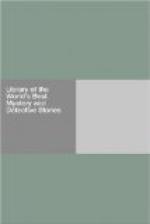“No.”
“I thought as much. He was some lunatic who escaped from Stefansfeld or somewhere—Faith, he did well to hang himself. When one is good for nothing, that’s the simplest way for it.”
The following day I left Hirschwiller. I shall never return.
The Invisible Eye
About this time (said Christian), poor as a church mouse, I took refuge in the roof of an old house in Minnesaenger Street, Nuremberg, and made my nest in the corner of the garret.
I was compelled to work over my straw bed to reach the window, but this window was in the gable end, and the view from it was magnificent, both town and country being spread out before me.
I could see the cats walking gravely in the gutters; the storks, their beaks filled with frogs, carrying nourishment to their ravenous brood; the pigeons, springing from their cotes, their tails spread like fans, hovering over the streets.
In the evening, when the bells called the world to the Angelus, with my elbows upon the edge of the roof, I listened to their melancholy chimes; I watched the windows as, one by one, they were lighted up; the good burghers smoking their pipes on the sidewalks; the young girls in their red skirts, with their pitchers under their arms, laughing and chatting around the fountain “Saint Sebalt.” Insensibly all this faded away, the bats commenced their rapid course, and I retired to my mattress in sweet peace and tranquillity.
The old curiosity seller, Toubac, knew the way to my little lodging as well as I did, and was not afraid to climb the ladder. Every week his ugly head, adorned with a reddish cap, raised the trapdoor, his fingers grasped the ledge, and he cried out in a nasal tone:
“Well, well, Master Christian, have you anything?”
To which I replied:
“Come in. Why in the devil don’t you come in? I am just finishing a little landscape, and you must tell me what you think of it.”
Then his great back, seeming to elongate, grew up, even to the roof, and the good man laughed silently.
I must do justice to Toubac: he never haggled with me about prices; he bought all my paintings at fifteen florins, one with the other, and sold them again for forty each. “This was an honest Jew!”
I began to grow fond of this mode of existence, and to find new charms in it day by day.
Just at this time the city of Nuremberg was agitated by a strange and mysterious event. Not far from my dormer window, a little to the left, stood the Inn Boeuf-Gras, an old auberge much patronized throughout the country. Three or four wagons, filled with sacks or casks, were always drawn up before the door, where the rustic drivers were in the habit of stopping, on their way to the market, to take their morning draught of wine.
The gable end of the inn was distinguished by its peculiar form. It was very narrow, pointed, and, on two sides, cut-in teeth, like a saw. The carvings were strangely grotesque, interwoven and ornamenting the cornices and surrounding the windows; but the most remarkable fact was that the house opposite reproduced exactly the same sculptures, the same ornaments; even the signboard, with its post and spiral of iron, was exactly copied.




